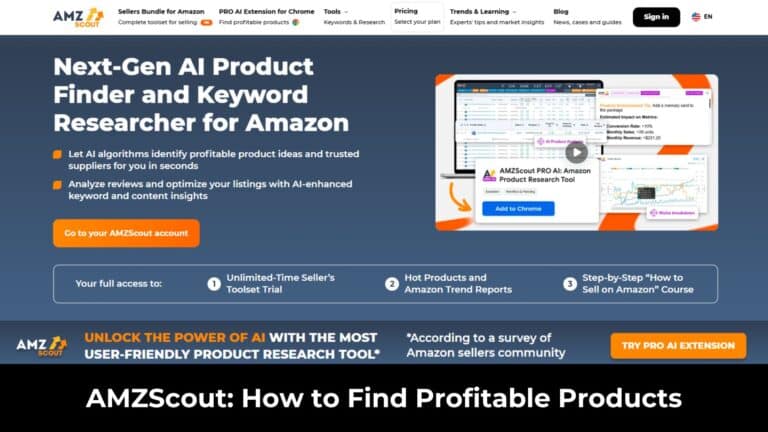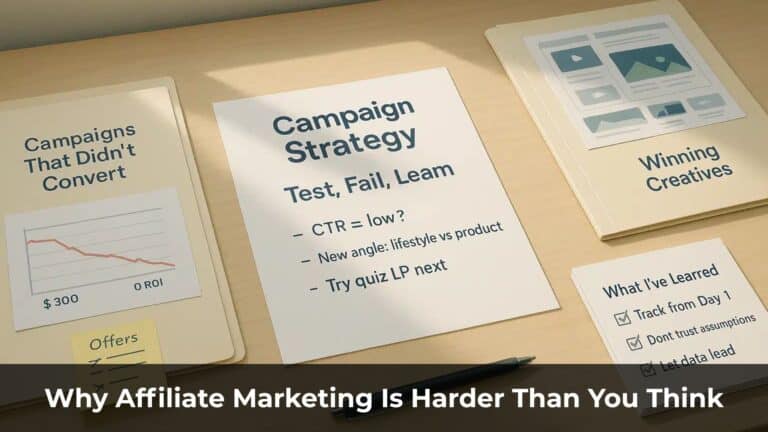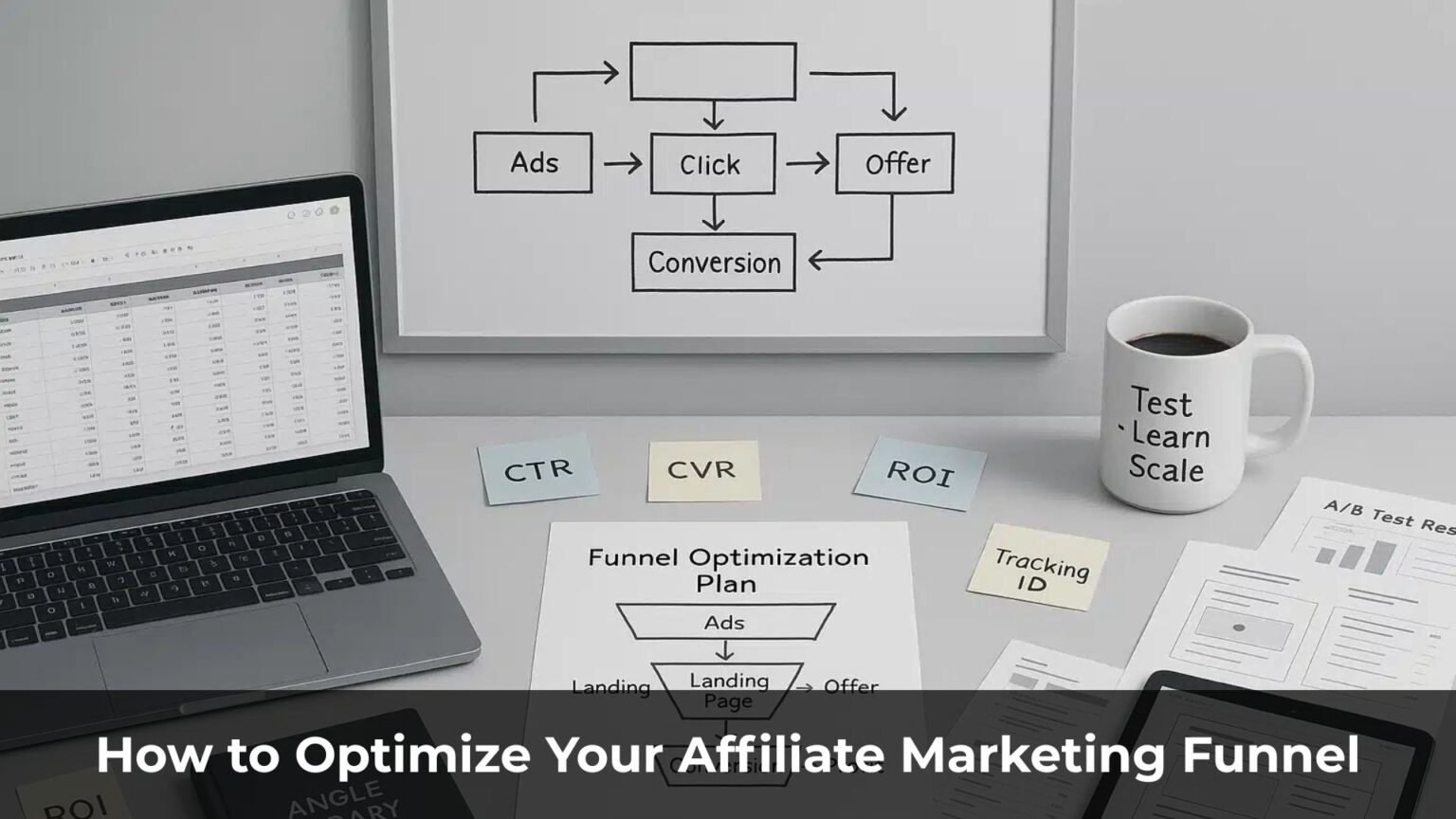If you’re reading these words, chances are you’re like me—diving headfirst into the world of affiliate marketing. A path filled with challenges, but equally packed with excitement.
Many people paint affiliate marketing as an “easy money-making scheme from home.” But my hard-earned experience tells a different story. That’s just the glossy surface.
The harsh reality is far more complex: this is a game of preparation—and survival. It’s not for dreamers who only see the upside while ignoring the shadows lurking beneath.
This article isn’t meant to scare you off. Quite the opposite.
I want to equip you with a practical risk management mindset. This is the critical factor, the survival skill that separates the professionals from the amateurs.
It helps you not just make money, but more importantly, survive and thrive sustainably in this ever-changing affiliate marketing landscape.
Table of Contents
ToggleWhy Risk Management Is the Ultimate Survival Skill in Affiliate Marketing
I’ve witnessed too many marketers jump into affiliate marketing with initial enthusiasm, only to crash and burn when facing unexpected obstacles.
They fail not because they lack intelligence or work ethic, but largely because they’re overconfident and underprepared.
In this field, nobody is bulletproof. There are only those who know themselves and their environment, constantly preparing for the worst-case scenarios that might strike.
Taking the time to sit down and seriously identify potential risks, then mapping out contingency plans, is absolutely crucial.
This is a mandatory strategic exercise if you truly consider affiliate marketing a serious business venture.
“One hour spent mapping out risks and solutions today could save you months of crisis, financial loss, and mental anguish later.”
So what are these specific risks, and how can you prepare for them in the most practical way possible?
Let’s dive deep into each “secret” I’ve learned the hard way.
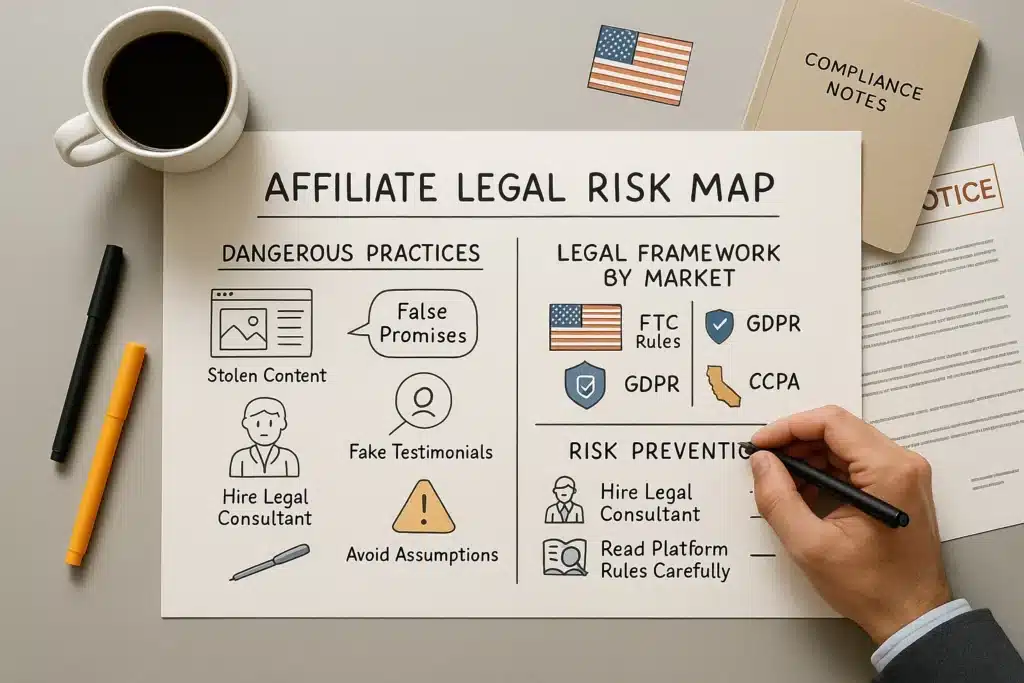
Legal Risk Prevention in Affiliate Marketing
This is one of the risks that many newbies (and sometimes even experienced marketers who get complacent) tend to overlook.
Yet the consequences can be devastating. You might be earning great money, your ROI might be flourishing, but just one small legal issue can cause everything you’ve built to come crashing down.
Never “Borrow” Without Permission
I see countless marketers who, when creating landing pages or ad content, habitually “grab” images, videos, or testimonials from the web without seeking permission from the owners.
This is a dangerous practice. You could be sued for copyright infringement at any moment, and the compensation amounts can be substantial.
Even more dangerous is making false claims, unsubstantiated statements, or gross exaggerations about the products or services you’re promoting.
Examples: “This product cures disease X 100%” or “Make $1000/day as easily as eating candy with method Y.”
Such advertising claims not only deceive customers but also seriously violate advertising laws in most countries.
Understand the “Rules of the Game” in Your Target Market
Every market and country has its own regulations regarding advertising, consumer protection, and privacy.
For instance, when running ads in the US, you must comply with FTC regulations, especially regarding disclosure (clearly stating that you’re an affiliate).
In Europe, there’s GDPR, California has CCPA…
Note: Take time to thoroughly research the legal requirements in your target market. Don’t just skim through or rely on hearsay.
If your budget allows and you’re uncertain (especially when running campaigns in sensitive niches like finance or health), don’t hesitate to hire a lawyer or legal consultant.
They can review your ad content, landing pages, and sales processes.
“A letter from the FTC or local regulatory agency can end your affiliate career. Never gamble with the law.”

Technical Infrastructure Risk Management
Technical issues like slow internet, server crashes, website downtime… are often overlooked until they actually happen.
And when they do occur, the damage is already substantial. Don’t let seemingly minor factors like these destroy your hard work and investment.
Weak Internet Connection or Complete Outage
You’re optimizing a profitable campaign, adjusting bid prices, or monitoring metrics… when suddenly your internet connection flickers and dies completely.
This situation isn’t just frustrating—it can cause you to miss golden opportunities or fail to address urgent issues (like stopping a campaign that’s bleeding money).
Solution: Always have at least one backup internet connection.
- A high-speed 4G/5G mobile hotspot from your phone
- A dedicated 4G/5G USB modem
- A subscription with a second internet service provider (if available)
Computer or Server Security Breaches
Your personal computer contains campaign data, advertising accounts, credit card information… what if it gets infected with malware?
Or what if your server hosting landing pages or websites gets hacked, injected with malicious code, or crashes due to overload/DDoS attacks?
These are genuine disasters that can cause you to lose data, money, and reputation.
Essential solutions:
- Regular Backups: Develop a habit of backing up all critical data (code, databases, documents, media) to secure external locations (external drives, cloud storage).
- Maximum Security – Passwords & 2FA: Use strong, complex, different passwords for each service. Enable two-factor authentication (2FA) wherever possible (email, ad platforms, hosting…).
- Maximum Security – Updates: Always update your operating system, browser, plugins, and themes to the latest versions to patch vulnerabilities.
- Personal Computer: Don’t skimp—invest in powerful antivirus and security software.
Website Downtime During Active Ad Campaigns
When you’re running paid traffic, every click to your landing page costs money.
If your landing page or website experiences downtime, you’re not just losing potential customers but literally throwing money out the window on useless clicks.
Imagine running a campaign with a $1,000/day budget and your landing page goes down for several hours—the financial damage is significant.
Preventive measures:
- Use Reliable Hosting: Don’t choose the cheapest hosting option. Research and select providers known for reliability, uptime guarantees, and good customer support.
- Implement Monitoring: Set up tools that alert you immediately if your website goes down (e.g., UptimeRobot, Pingdom).
- Create Backup Pages: Have backup landing pages ready on different servers that you can quickly redirect traffic to if your main page experiences issues.
- Test Before Scaling: Before increasing ad spend significantly, stress-test your infrastructure to ensure it can handle the expected traffic volume.
“In affiliate marketing, your technical infrastructure is like the foundation of a house. No matter how beautiful the house looks, if the foundation is weak, everything will eventually collapse.”
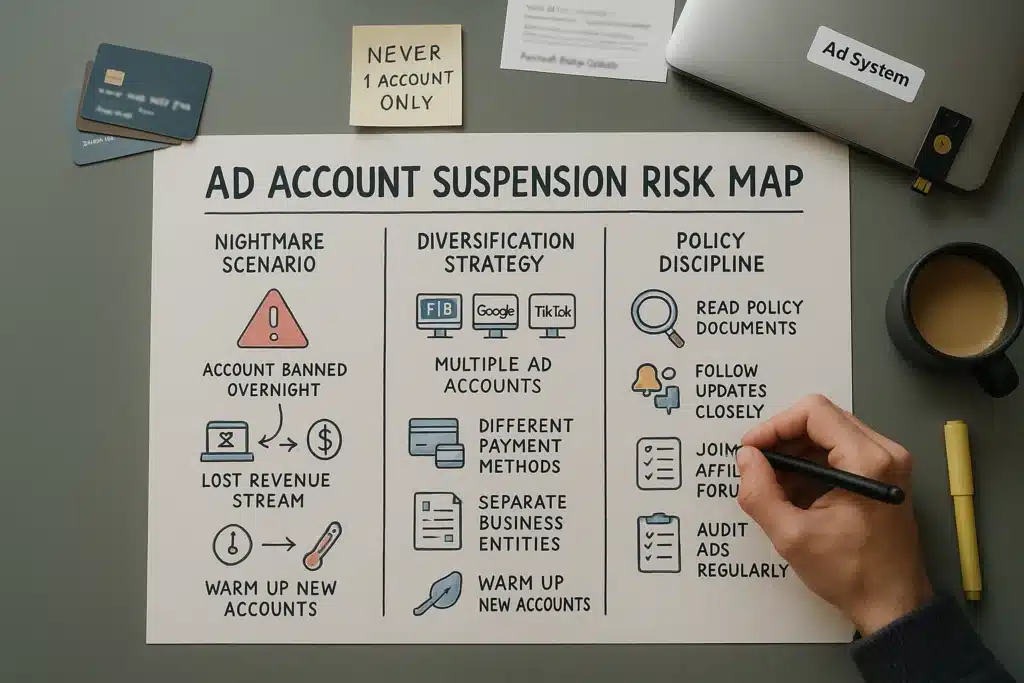
The Ad Account Suspension Nightmare
What’s the scariest thing an affiliate marketer can face? For many, it’s waking up to find their ad accounts suspended—often without clear explanation.
This is especially terrifying when you’ve been scaling a profitable campaign and suddenly everything stops. Your income stream vanishes overnight.
Never Put All Your Eggs in One Basket
I’ve seen too many affiliates build their entire business on a single ad platform, only to have everything crumble when that account gets restricted or banned.
The harsh truth? In today’s digital advertising landscape, account suspensions aren’t a matter of “if” but “when.”
Essential diversification strategy:
- Multiple Ad Accounts: Create and nurture several accounts across different platforms (Facebook, Google, TikTok, native networks, etc.).
- Different Payment Methods: Use various credit cards and payment methods across your accounts.
- Separate Business Entities: If you’re operating at scale, consider creating separate business entities for different marketing operations.
- Warm Up New Accounts: Don’t immediately push new accounts to their limits. Start small, build history, and gradually increase spend.
Understand and Respect Platform Policies
Each advertising platform has its own set of rules, and these rules change frequently. What worked yesterday might get your account banned today.
Many affiliates get suspended not because they’re intentionally breaking rules, but because they don’t fully understand the policies or miss important updates.
Preventive measures:
- Read Policy Documents: Yes, they’re boring, but knowing the rules is your first line of defense.
- Follow Policy Update Announcements: Subscribe to official blogs and newsletters from ad platforms.
- Join Industry Communities: Often, other marketers will spot and share policy changes before you encounter them.
- Audit Your Campaigns Regularly: Review your ads, landing pages, and offers against current policies, not just when you create them.
“In affiliate marketing, your ad accounts are your lifeline. Protecting them should be as important as protecting your bank account.”
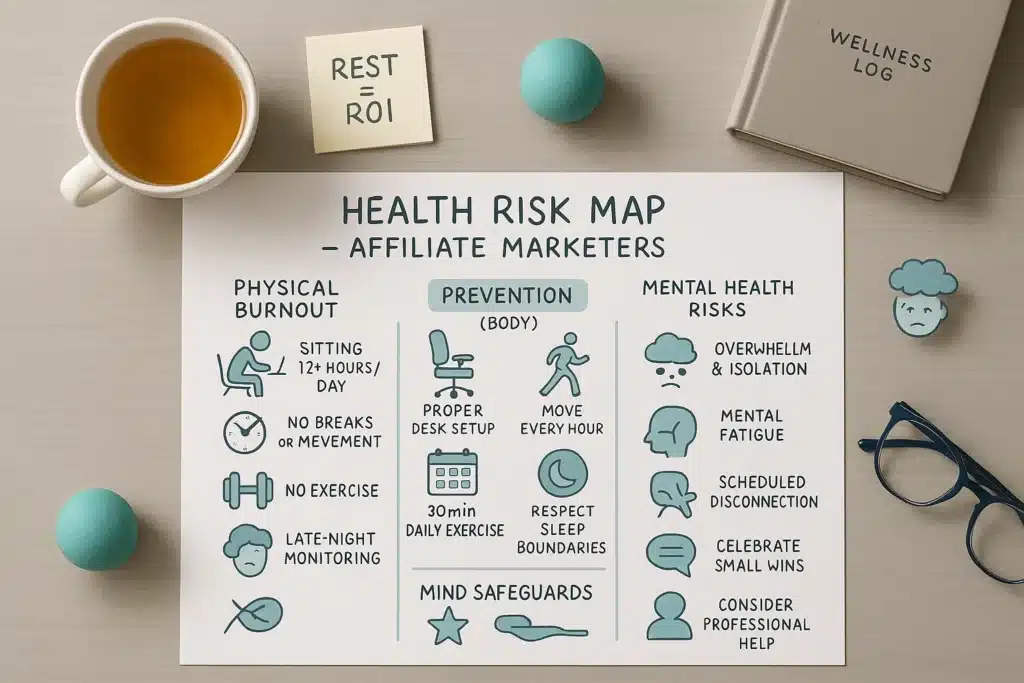
Health Protection – The “Hidden Cost” of the Affiliate Race
In the relentless pursuit of profitable campaigns and scaling success, many affiliates overlook perhaps the most important asset they have: their health.
Physical and mental burnout isn’t just a theoretical risk—it’s an epidemic in this industry that few talk about openly.
I’ve watched brilliant marketers flame out not because their strategies failed, but because their bodies and minds couldn’t sustain the pace they were setting.
The Physical Toll of the Digital Grind
Sitting for 12+ hours a day, eyes fixed on screens, shoulders hunched over keyboards… The physical impact accumulates silently until it suddenly demands attention through pain, fatigue, or worse.
Preventive measures:
- Ergonomic Setup: Invest in a proper chair, desk, and monitor setup. This isn’t luxury—it’s infrastructure.
- Movement Breaks: Set a timer to stand up and move every hour. Your campaign can wait 5 minutes.
- Regular Exercise: Schedule it like you would an important meeting. Even 30 minutes of moderate activity can counteract hours of sitting.
- Sleep Hygiene: Resist the temptation to check campaigns at 2 AM. Set boundaries between work and rest.
Mental Fatigue and Decision Paralysis
The constant pressure to optimize, the emotional rollercoaster of campaign performance, the isolation that often comes with this career path—all take a severe mental toll.
When your mind is foggy, your decision-making suffers. And in affiliate marketing, poor decisions quickly translate to financial losses.
Mental health safeguards:
- Scheduled Disconnection: Set specific times when you completely disconnect from work. No checking stats, no reading industry news.
- Celebrate Small Wins: Don’t just focus on what’s not working or what could be better. Acknowledge your successes, however small.
- Build a Support Network: Connect with other affiliates who understand your challenges. Sometimes just talking through a problem provides relief.
- Consider Professional Support: Therapy isn’t just for crisis situations—it can be preventive maintenance for your most valuable asset: your mind.
“Your health is your true ROI. No campaign success is worth sacrificing your physical and mental wellbeing.”
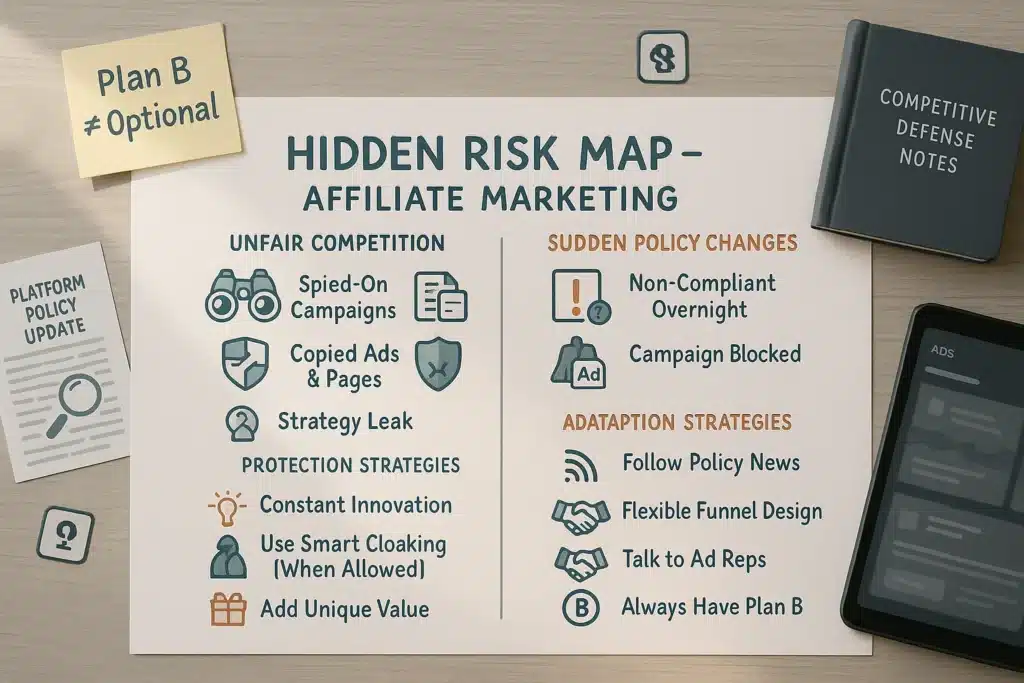
Recognizing “Hidden” Risks – The Dangers You Don’t See Coming
While obvious risks like account suspensions get all the attention, it’s often the hidden, unexpected threats that cause the most damage. Let’s uncover these lurking dangers.
Unfair Competition – Being “Spied On” and Copied
In the competitive world of affiliate marketing, your successful campaigns are constantly being watched, analyzed, and copied by competitors.
Spy tools make it easier than ever for others to see your ads, landing pages, and even estimate your bidding strategy. Before you know it, your winning campaign formula becomes public knowledge.
Protection strategies:
- Constant Innovation: Never become complacent with a winning formula. Always be testing new angles, creatives, and approaches.
- Cloaking (When Appropriate): Use legitimate cloaking methods to show different content to different visitors based on IP addresses or other factors.
- Unique Value Addition: Add elements to your funnel that are difficult to copy—personalized follow-ups, custom bonuses, or exceptional service.
- Trademark Your Brand Elements: If you’ve developed a unique brand or system, consider legal protection through trademarks.
Sudden Policy Changes – Becoming Non-Compliant Overnight
One day your campaigns are running smoothly; the next, a platform changes its policies and suddenly your entire approach is prohibited.
This happens more frequently than you might think, especially in sensitive niches like health, finance, or anything related to current events.
Adaptation strategies:
- Stay Informed: Follow industry news sources and official platform blogs religiously.
- Build Flexibility Into Your Funnels: Design your campaigns so that critical elements can be quickly modified if policies change.
- Maintain Relationships With Account Managers: When available, these connections can provide early warnings about upcoming changes.
- Have “Plan B” Campaigns: Always have alternative campaign approaches ready to deploy if your primary strategy becomes non-compliant.
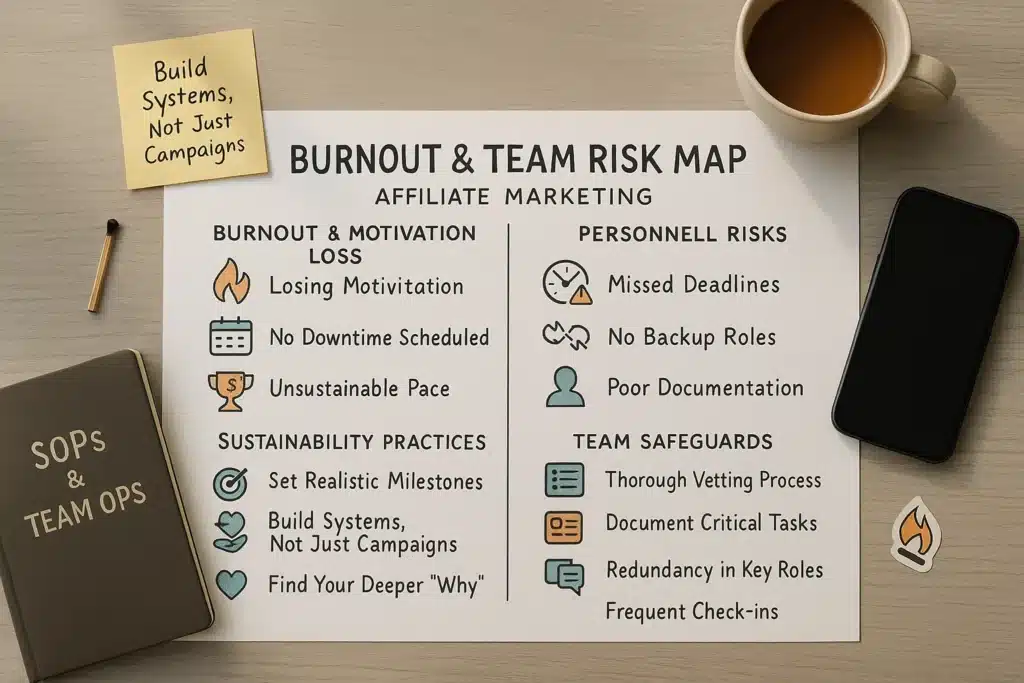
Burnout and Motivation Loss – “Burning” Your Passion
The affiliate marketing journey is a marathon, not a sprint. Yet many marketers operate at unsustainable intensity levels, leading to burnout and a complete loss of motivation.
When you lose your drive, even the most profitable campaigns can’t save you from declining performance.
Sustainability practices:
- Set Realistic Goals: Break down your journey into achievable milestones rather than focusing solely on end results.
- Create Systems, Not Just Campaigns: Develop processes that can run without your constant attention.
- Find Your “Why” Beyond Money: Connect your work to deeper motivations that sustain you when immediate results fluctuate.
- Schedule Regular Breaks: Plan vacations and downtime in advance—and actually take them, completely disconnected from work.
Personnel Risks (If Working With a Team/VAs) – “Caught” Between Deadlines
As your operation grows, you’ll likely bring on team members or virtual assistants. This introduces an entirely new category of risks.
From missed deadlines to quality control issues to outright fraud, personnel problems can derail even the most promising affiliate business.
Team management safeguards:
- Thorough Vetting Process: Take time to properly screen potential team members, checking references and testing skills.
- Clear Documentation: Create detailed SOPs (Standard Operating Procedures) for all critical processes.
- Redundancy in Critical Roles: Ensure no single person is the only one who knows how to perform essential functions.
- Regular Check-ins and Feedback: Maintain open communication channels to catch issues before they become crises.
“The most dangerous threats are the ones you don’t see coming. In affiliate marketing, paranoia isn’t a disorder—it’s a survival skill.”
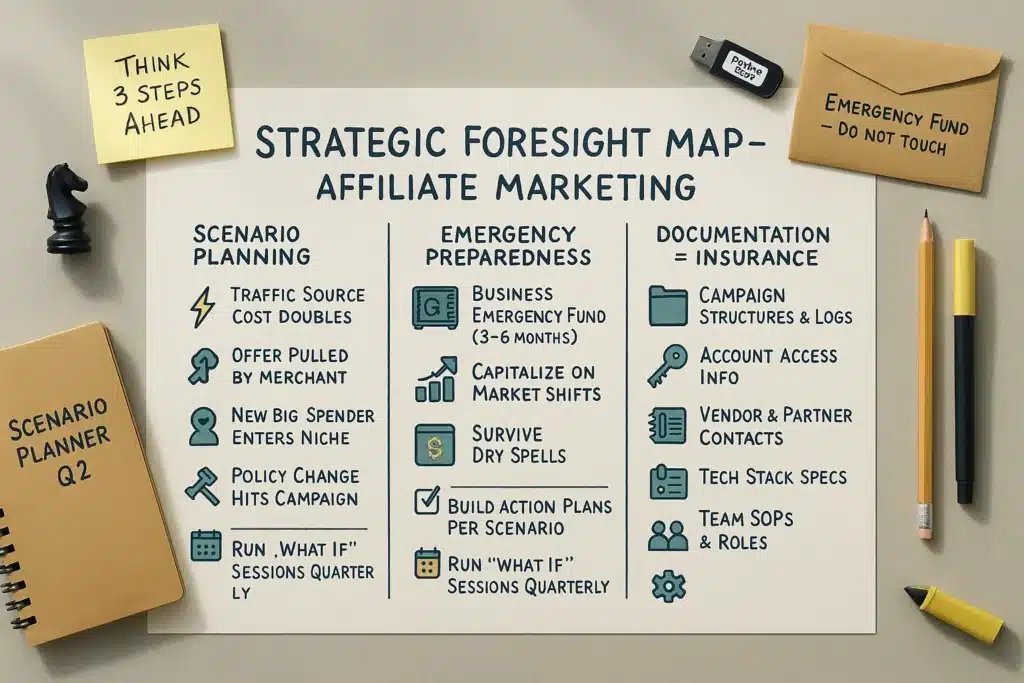
The “Think Three Steps Ahead” Mindset: Preparing for What Others Don’t See Coming
The most successful affiliate marketers I know share one common trait: they don’t just react to problems—they anticipate them.
They operate with a chess player’s mentality, always thinking several moves ahead while their competitors are focused only on the immediate play.
Scenario Planning: The Ultimate Preparation Tool
Take time each quarter to run through “what if” scenarios for your business:
- What if your main traffic source suddenly doubles in cost?
- What if your top-performing offer gets pulled by the merchant?
- What if a major competitor enters your niche with a massive budget?
- What if regulatory changes affect how you can advertise in your market?
For each scenario, develop a concrete action plan—not just vague ideas, but specific steps you would take, resources you would need, and timelines for implementation.
The Emergency Fund: Not Just for Personal Finance
Just as financial advisors recommend having 3-6 months of living expenses saved for personal emergencies, your affiliate business needs its own safety net.
Set aside a percentage of profits specifically for business emergencies—whether that’s surviving a dry spell, quickly adapting to market changes, or capitalizing on unexpected opportunities.
“The difference between amateur and professional affiliates isn’t just skill—it’s preparation. Professionals build systems that can weather storms; amateurs pray for good weather.”
Documentation: Your Business Insurance Policy
Create and maintain detailed documentation for every aspect of your business:
- Campaign structures and performance history
- Account access and recovery information
- Vendor and partner contacts
- Technical setup specifications
- Team responsibilities and procedures
This documentation isn’t just for organization—it’s your insurance policy against disaster. If your computer crashes, if you fall ill, or if key team members leave, these documents ensure your business can continue operating.
Conclusion: Calm Progress in a World of Affiliate Chaos
Risk management in affiliate marketing isn’t about fear—it’s about freedom. When you’ve prepared for the worst, you can operate with confidence even in uncertain conditions.
The strategies I’ve shared aren’t theoretical concepts—they’re battle-tested approaches that have saved my business (and my sanity) multiple times throughout my affiliate journey.
Remember that in this industry, it’s not always the most talented marketers who succeed long-term. Often, it’s those who can weather the inevitable storms, adapt to changing conditions, and maintain their focus when others are panicking.
As you implement these risk management practices, you’ll notice something interesting: your decision-making improves. When you’re not constantly putting out fires, you can think more strategically and spot opportunities others miss.
The affiliate marketing landscape will always be challenging—that’s part of what makes success in this field so rewarding. But with proper risk management, you can transform those challenges from existential threats into manageable obstacles.
Start today by identifying your most significant vulnerabilities. Which of the risks we’ve discussed poses the greatest threat to your affiliate business right now? Begin there, implement the suggested safeguards, and then systematically work through the others.
Your future self will thank you for the peace of mind that comes from knowing you’re prepared for whatever the affiliate marketing world throws your way.
“In the unpredictable world of affiliate marketing, the best competitive advantage isn’t just knowing how to win—it’s knowing how to survive when things go wrong.”


